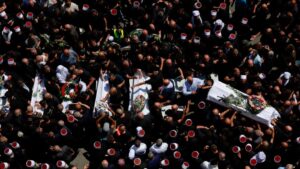Israel’s security cabinet greenlights response to Hezbollah’s rocket strike on golan heights

Israel’s security cabinet has allowed Prime Minister Benjamin Netanyahu and Defense Minister Yoav Gallant to determine how to respond to a recent rocket strike by Hezbollah on the Israeli-occupied Golan Heights. Hezbollah initially disputed responsibility for the bombing, which killed 12 teenagers and children in the Druze community of Majdal Shams. The rockets were recognized as Iranian-made and fired from southern Lebanon, suggesting Hezbollah despite their denials.
The Israeli military has already launched airstrikes against Hezbollah targets in southern Lebanon. However, a more significant response is expected after the security cabinet’s consent. The US, which supports Israel’s position, has also blamed Hezbollah for the strike and is working on diplomatic measures to prevent further escalation. The situation has heightened regional tensions, with fears that a larger battle between Israel and Hezbollah would break out, potentially involving other regional countries such as Iran and the US.
Israeli leaders have highlighted the importance of a firm response to preserve security and stability, with some pushing for a full-scale military campaign against Hezbollah. Diplomatic attempts are continue to manage the dispute and avoid an all-out war, but the situation remains extremely unpredictable.
Israel has pledged revenge against Hezbollah in Lebanon, as Israeli jets attacked targets in southern Lebanon throughout the day on Sunday. However, there were expectations that a more harsh response would follow the security cabinet meeting called upon by Netanyahu in Tel Aviv. Following the discussion, Netanyahu’s office stated that the cabinet had “authorized the Prime Minister and Defense Minister to decide on the manner and timing of the response.”
Diplomatic attempts are ongoing to keep the crisis from escalating into a full-fledged conflict. The US is apparently working on diplomatic steps to calm down the conflict, while also supporting Israel’s defense moves. To complicate matters, Turkish President Recep Tayyip Erdogan delivered a veiled threat to Israel, comparing his stance to Saddam Hussein’s. This has provoked anger and condemnation from Israeli and international officials, with some urging for NATO to intervene against Erdogan’s aggressive words.
This recent round of violence is part of a bigger pattern of continuing conflicts between Israel and Hezbollah, which have flared up on occasion over the years. The present escalation highlights the region’s weak security situation and the ease with which it can be destabilized. The involvement of global powers such as the United States and Turkey complicates matters further, since their actions and remarks have the potential to substantially alter the course of events.
